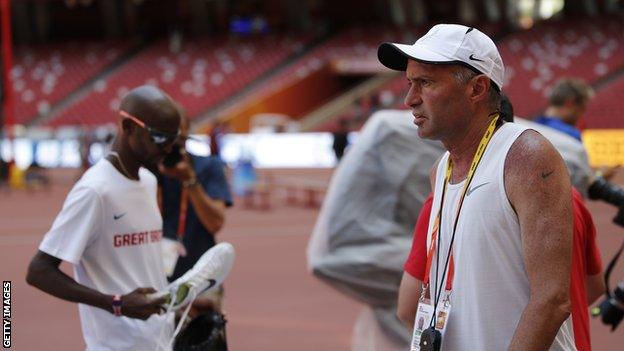Mo Farah: Four-time Olympic champion 'not guilty by association' with banned ex-coach Alberto Salazar
- Published
Alberto Salazar: Mo Farah should not be seen as guilty by association - Steve Cram
Four-time Olympic champion Mo Farah "hasn't done anything wrong" and should not be seen as guilty by his association with banned coach Alberto Salazar, says Steve Cram.
On Monday, Salazar was banned from athletics for four years after being found guilty of doping violations.
Salazar runs the Nike Oregon Project (NOP), where he coached Briton Farah between 2011-2017.
"Mo Farah is a great champion and he hasn't done anything wrong," said Cram.
The Nike ambassador, BBC athletics commentator and former world 1500m champion added: "To create guilt by association is also wrong. He has never been found guilty of any offences and so you have to accept that.
"It's up to the public to make judgements - we all have opinions but at the moment there's absolutely nothing that says there's anything wrong with what Mo Farah has done."
The decision to sanction Cuba-born American Salazar, 61, follows a four-year investigation by the US Anti-Doping Agency (Usada) and a two-year court battle behind closed doors.
The investigation into Salazar began after a BBC Panorama programme in 2015. UK Athletics (UKA), the sport's UK governing body, then conducted its own review into the claims and gave Farah the green light to continue working with Salazar.
Farah split with Salazar in 2017, which was the same year the coach was first charged by Usada but the Briton insists he was not aware of the doping charges at the time.
During his time at the NOP, 5,000m and 10,000m runner Farah won six world titles in addition to his four Olympic gold medals, and said he was "glad" a conclusion had been made.
He added: "I have no tolerance for anyone who breaks the rules or crosses a line."
Athletes must sever relationships - Lord Coe
IAAF president Lord Coe told BBC Sport the governing body's Athletics Integrity Unit would be asking athletes to "sever their relationships" with Salazar amid the "very serious charges".
"The charges laid by Usada are really serious," Lord Coe said. "The Athletics Integrity Unit has already been in contact with those athletes [at NOP]. They are going to be asked to sever their relationships and that's exactly where we are at the moment.
"Athletes have to have complete and total trust in their coaches. If they don't, their relationship will fray. And when a coach is accused of something, an athlete has to ask really detailed, tough questions."

Farah has never failed a drugs test and has always strongly denied breaking any rules
If you break the rules, there are going to be penalties - Cram
Cram had previously dismissed Panorama's allegations about NOP as "historical" and said there was a "witchhunt" against Farah.
"Mo trusted the people around him until such a point that he decided to make a change," he said.
"How the timing looks is open to interpretation. Mo has had an incredible career and will continue to have a great career."
Dr Jeffrey Brown, a Nike-paid endocrinologist who treated many of Salazar's athletes, has also been banned for four years.
An independent panel found Salazar and Brown possessed and trafficked a banned performance-enhancing substance and administered or attempted to administer a prohibited method to multiple track and field athletes.
It added that Salazar "tampered and/or attempted to tamper with the doping control process".
"A four year ban is about as bad as it could be for Salazar," said Cram. "For him and some of the athletes associated with him it's terrible news.
"In the world of high performance sport, we are working in very small margins, people are looking for where they can gain an advantage in terms of performance.
"The top coaches and top scientists are there to try and explore those avenues but you have to do it within the rules.
"I think even within the judgement they said he may not have deliberately done that, but he did break the rules. If you break the rules, there are going to be penalties to pay.
"Whatever his motives were or are, and he'll defend that, once you step over the line, you've stepped over the line and so it looks as though he is going to have to suffer the consequences of that."